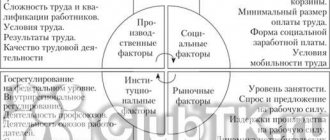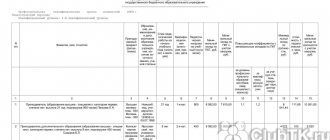Home / Labor Law / Payment and benefits / Wages
Back
Published: 03/08/2016
Reading time: 5 min
0
4662
At any time, an employee is faced with a situation where, for one reason or another, he cannot withdraw his earnings from the employer .
This could be due to the employee’s serious illness, being involved in an accident, or simply due to vacation. In our article we will analyze in detail what a deposited salary is, how it is calculated and where and under what conditions this salary is received.
We will also shed light on other issues of interest to working people.
- What it is?
- In what cases may it be necessary to deposit wages?
- Shelf life
- How to release deposited wages Employee actions
- Accountant Actions What is a payroll escrow notice?
What is the point of depositing?
According to the law, the employer can choose the method of paying remuneration earned by employees:
- non-cash payments that do not require the personal presence of employees,
- cash payment according to the statement.
In the latter case, it is assumed that this occurs at the place of work, and non-working hours of the staff will not be spent on travel in order to receive the finances they deserve.
If the worker did not have time to go to the cashier, personally sign the statement and collect his money at the appointed time, and did not instruct anyone to do this in his place, the unissued salary must be deposited.
Depositing is an accounting reflection in the primary accounting documentation of salary amounts as not issued to the employee.
Deadlines for deposit
If the salary is issued in cache, this must be reflected in special unified document forms approved by Decree of the State Statistics Committee of Russia dated January 5, 2004 No. 1:
- payroll - T-53;
- payroll - T-49.
The first page of this document must include the date when it was generated and the salary was issued. The period that can be kept in the company’s cash register, and therefore the time for employees to receive them, is limited by the source of finance intended for the payment of labor remuneration:
- the money has been received from the bank - from the date of receipt, including this day, the funds can be kept in the cash register for no longer than 5 days, then they will have to be returned back to the bank;
- cash from the proceeds is used as salary - this money remains a financial cash limit, therefore it must be withdrawn at the end of the working day if the amount is greater than the allowed cash balance; In this case, the salary must be paid during the current day.
If the established time has elapsed and the employee does not show up to collect his money, the accountant will deposit it and the statement will be closed.
How to write off arrears of deposited wages with an expired statute of limitations?
If the salary is not claimed within three years
If an employee has not applied for wages within three years, then the accountant includes it as part of other income in accounting, and in tax accounting – as part of non-operating income. To do this, you need to take an inventory of payments to employees for wages, prepare an inventory report, draw up an accounting certificate and issue an order from the head of the organization. The corresponding income must be recognized on the last day of the reporting period itself in which the statute of limitations expires.
Actions of the accountant (cashier) during deposit
After the time allotted for paying wages has expired, the accountant must carry out sequential actions regulated by the Procedure for Conducting Cash Transactions (clause 18 talks about depositing).
- To confirm the receipt of money by employees, the corresponding columns are provided in the statements: 23 – “Received money” in the payroll and 5 – “Signature on receipt of money” in the settlement and payment slip. If, after the allowed time has elapsed after opening the statement, no employee signatures appear in these columns, the accountant applies a special stamp or writes “Deposited” in them.
- At the bottom of the statements, they are indicated separately and the issued and deposited salaries are calculated; they must coincide with the total, which is what the cashier (accountant) signs on the statement.
- The numbers of deposited salaries are entered into a special register (the form is not approved by law; an enterprise can develop it independently and record it in internal documentation).
- For sums of money issued as wages, it is required to draw up an expense cash order (form No. KO-2, approved by Decree of the State Statistics Committee of Russia dated August 18, 1998 No. 88), its details are also noted on the statement and entered into the cash book.
- All records previously certified by the signature of the accountant (cashier) must be transferred for control to the chief accountant or management.
- The cashier is obliged to hand over money not given to employees to the bank, since it is prohibited to keep amounts in the cash register that exceed the permitted limits, even if they are intended for future expenses.
IMPORTANT! If the funds were issued not by the cashier, but by another person on his behalf, then at the bottom of the document an additional mark is required about who issued the money according to this statement.
How to arrange the release of deposited wages from the cash desk by proxy ?
General rules for payment of wages
Wages are the equivalent monetary expression of work performed, services rendered, the amount of which depends on the complexity of the work and the volume of labor applied.
Payment of remuneration for work performed should be carried out according to several rules:
- The issuance of funds is carried out in cash at the cash desk of the enterprise;
- Transfer in non-cash terms to the employee’s bank account, after providing documentation with card or savings book details;
- Wages can be paid in kind, which must be done by agreement between the employer and the employee, but the amount of payment in kind should not exceed 20% of the total amount of wages to be paid.
Transfers and methods of payment for work must be specified in the text of the employment contract with the employee. The issuance of monetary remuneration is carried out personally to the employee or representative with the appropriate power of attorney to receive remuneration.
To ensure compliance with Article 136 of the Labor Code, it is recommended that wages be paid twice per working month. However, the company retains the right to choose without making an advance payment for wages.
- For the first 15 days of the month, the organization pays an advance, towards the due payment for the full month. The amounts of social charges are not deducted from the advance funds. In the collective agreement or employment agreement, the employer must indicate:
- The date of payment of the advance payment and the remaining wages, as well as the maximum terms of payment;
- The monetary value of the amount of the advance paid for all employees or separately for structural areas, but not higher than the monthly tariff salary or rate. To control the amounts of the advance payment, timekeepers must provide time sheets to the accounting department of the accounting department twice during the reporting period, before the approved date of the advance payment and before the day of full payment for the month.
- If the company does not practice issuing advance payments, then the monthly payment is made before the 15th day of the month following the reporting period. Social charges are deducted from the total monthly wage.
Accounting entries for deposited salaries
It doesn’t matter when exactly the staff representative should have received it in his hands and did not receive his “hard-earned money”, accounting for the salary should concern the month when it was accrued, as stated in paragraph 5 of PBU 1/2008. Accounting procedures are divided into three parts: accrual, deposit and payment of deposited salary.
Payroll payments:
- debit 20 (23, 25, 26, 29, 44), credit 70 – “Salaries accrued”;
- debit 70, credit 68, subaccount “Calculations for personal income tax” - “Personal income tax is withheld from the amount of wages”;
- debit 70, credit 50 (51) - “Salaries paid minus the amount of personal income tax.”
Deposit of salary amounts is carried out in the subaccount “Settlements on deposited amounts”, which is part of account 76 “Settlements with various debtors and creditors”:
- debit 70, credit 76 – “The amount of uncollected salary has been deposited”;
- debit 51, credit 50 - “The amount of deposited wages has been credited to the organization’s current account.”
Payment of deposited salary funds:
- debit 50, credit 51 – “Money was received from the bank for the issuance of deposited salaries”;
- debit 76, credit 50, subaccount “Calculations for deposited amounts” - “Deposited salary issued to employee.”
Question: What is the period for withholding and paying personal income tax on wages deposited by the employer? View answer
Nuances of the operation
A depositor is an accounting operation implemented within the framework of the law. It is drawn up by a person authorized to conduct financial transactions.
In fact, it does not pose any problems for the employee if they apply for payment in a timely manner. If sufficient funds are not available at the cash desk due to spending or transfer to a current account, the recipient will have to wait for a return transfer or cash replenishment to be processed. It is worth noting that when an employee requests to pay money after a three-year period after sending the money to the depositor, he should expect the transaction to be refused, since after this time the money is subject to automatic write-off.
Escrow money, taxes and fees
If finances for salary are received from a bank , personal income tax from them is transferred immediately upon receipt, on the same date (paragraph 1, paragraph 6, article 226 of the Tax Code of the Russian Federation), even before the salary sheet is opened for paying money to staff.
Proceeds in cash for payment of earned money allow personal income tax to be withheld when the money is given to workers (clause 4 of Article 226 of the Tax Code of the Russian Federation), and tax payments can be made on the day following the salary.
Contributions to various social insurance funds must be made regardless of the days of payment of salaries: for this, a mandatory period is provided, not exceeding the middle of the month following the salary period (Part 5, Article 15 of the Federal Law of July 24, 2009 No. 212-FZ). Depositing your salary does not affect these deadlines in any way.
Payment of wages through the cash register: terms and rules
Do not reflect in the statements payments to individuals who worked in the organization under civil contracts . Regular payments on the payroll may become a reason for an attempt to reclassify civil contracts as employment contracts and charge additional insurance premiums.
The statement can only indicate amounts related to the wage fund and social benefits. Do not indicate in the statement, but issue according to separate cash settlements: reimbursement of travel expenses, compensation for the use of personal property, dividends, rent payments, etc.
How to receive deposited money?
An employee who is overdue for receiving his salary must contact the cashier or the secretariat (the form of appeal should be written or oral, it is decided by the enterprise). The registered application is transferred to the chief accountant, who will take these funds into account as additional cash receipts.
In what cases will the deposited salary no longer be returned?
If funds not received for any reason are returned to the company’s account, the person who earned them may claim them for a fairly long, but not infinite, period of time.
The funds returned to the bank, which at one time represented wages, will simply turn into the organization’s profit and can no longer be paid at the request of the employee after the expiration of a three-year period (Article 196 of the Civil Code of the Russian Federation).
If this happens, then these funds will be included in the income item, which is how they are taken into account in accounting and taxation.
The accountant is asked to reflect this as follows: debit 76, credit 91-1, subaccount “Calculations for deposited amounts” - “Deposited wages written off upon expiration of the claim period.”









